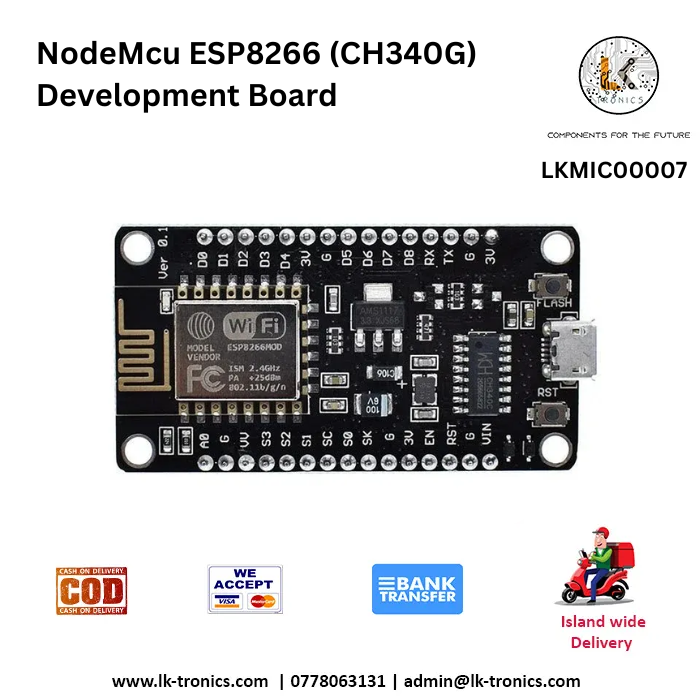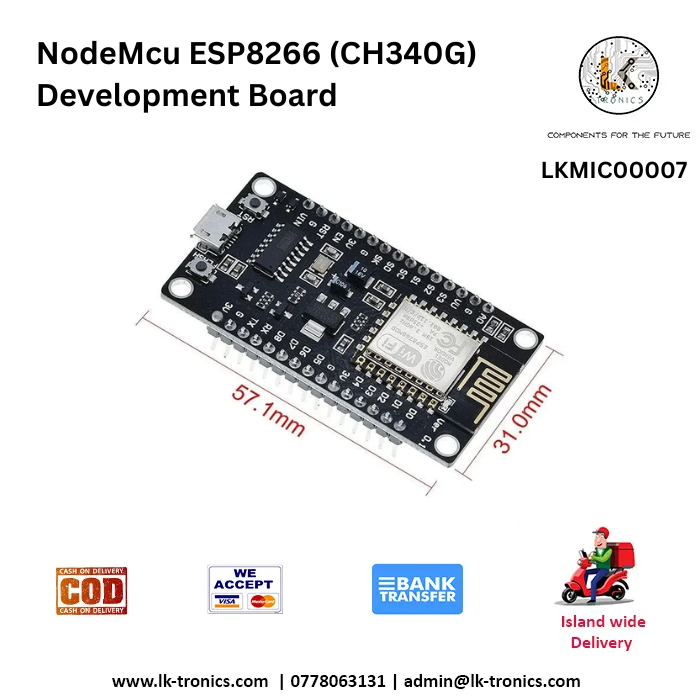NodeMcu ESP8266 (CH340G) Development Board
In stock
LKMIC00007
Advanced API for hardware IO, which can dramatically reduce the redundant work for configuring and manipulating hardware. Code like arduino, but interactively in Lua script.
Specification:
01. The Development Kit based on ESP8266, integates GPIO, PWM, IIC, 1-Wire and ADC all in one board.
02. Power your developement in the fastest way combinating with NodeMCU Firmware!
03. USB-TTL included, plug&play
04. 10 GPIO, every GPIO can be PWM, I2C, 1-wire
05. FCC CERTIFIED WI-FI module
06. PCB antenna
Rs.700.00 Rs.1,700.00
In stock
Compare-
Microcontrollers, Node Mcu
NodeMcu ESP8266 (CH340G) Development Board
LKMIC00007
Advanced API for hardware IO, which can dramatically reduce the redundant work for configuring and manipulating hardware. Code like arduino, but interactively in Lua script.
Specification:
01. The Development Kit based on ESP8266, integates GPIO, PWM, IIC, 1-Wire and ADC all in one board.
02. Power your developement in the fastest way combinating with NodeMCU Firmware!
03. USB-TTL included, plug&play
04. 10 GPIO, every GPIO can be PWM, I2C, 1-wire
05. FCC CERTIFIED WI-FI module
06. PCB antennaSKU: LKMIC00007
NodeMcu ESP8266 CH340G Development Board
The NodeMcu ESP8266 CH340G Development Board is a popular IoT development platform that combines the ESP8266 WiFi module with a USB-to-serial converter based on the CH340G chip. This board is widely used for building IoT applications due to its low cost, ease of use, and strong community support. Here are the detailed specifications and features:
Specifications
- Microcontroller: ESP8266
- Operating Voltage: 3.3V
- Input Voltage (Vin): 4.5V to 10V (typically 5V via USB)
- Digital I/O Pins: 11 (GPIOs)
- Analog Input Pins: 1 (0V to 3.3V input range)
- Flash Memory: 4MB (32Mb)
- SRAM: 64KB
- Clock Speed: 80MHz (can be overclocked to 160MHz)
- USB to Serial Converter: CH340G
- WiFi Standards: 802.11 b/g/n
- Operating Current: Average 80mA
- Dimensions: Typically around 50mm x 25mm x 13mm
Pin Configuration
- Vin: External power supply (4.5V-10V)
- 3V3: 3.3V output
- GND: Ground
- RST: Reset
- EN: Chip enable (active high)
- D0-D8: GPIO pins
- A0: Analog input
- TX: UART Transmit
- RX: UART Receive
Features
- Built-in WiFi: Integrated 802.11 b/g/n WiFi transceiver with full TCP/IP stack and microcontroller capability.
- USB to Serial Communication: CH340G USB-to-serial converter for easy programming and communication with a computer.
- Compatibility: Compatible with the Arduino IDE, allowing for easy programming with Arduino libraries and tools.
- Deep Sleep Mode: Supports deep sleep mode for low power consumption.
- Breadboard-Friendly: The compact design and pin layout make it suitable for breadboard use.
- Lua Scripting Support: Supports NodeMcu firmware for programming with Lua scripting language.
NodeMCU Development Board Pinout Configuration

| Pin Category | Name | Description |
| Power | Micro-USB, 3.3V, GND, Vin | Micro-USB: NodeMCU can be powered through the USB port
3.3V: Regulated 3.3V can be supplied to this pin to power the board
GND: Ground pins
Vin: External Power Supply |
| Control Pins | EN, RST | The pin and the button resets the microcontroller |
| Analog Pin | A0 | Used to measure analog voltage in the range of 0-3.3V |
| GPIO Pins | GPIO1 to GPIO16 | NodeMCU has 16 general purpose input-output pins on its board |
| SPI Pins | SD1, CMD, SD0, CLK | NodeMCU has four pins available for SPI communication. |
| UART Pins | TXD0, RXD0, TXD2, RXD2 | NodeMCU has two UART interfaces, UART0 (RXD0 & TXD0) and UART1 (RXD1 & TXD1). UART1 is used to upload the firmware/program. |
| I2C Pins | NodeMCU has I2C functionality support but due to the internal functionality of these pins, you have to find which pin is I2C. |
Based on 0 reviews
Be the first to review “NodeMcu ESP8266 (CH340G) Development Board”
You must be logged in to post a review.















There are no reviews yet.